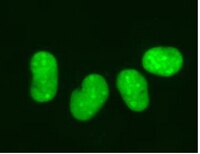17-10147 Sigma-AldrichLentiBrite™ GFP-HMGB1 Lentiviral Biosensor
Produits recommandés
Aperçu
| Replacement Information |
|---|
Tableau de caractéristiques principal
| Key Applications | Detection Methods |
|---|---|
| TFX, IF, ICC | Fluorescent |
| Description | |
|---|---|
| Catalogue Number | 17-10147 |
| Trade Name |
|
| Description | LentiBrite™ GFP-HMGB1 Lentiviral Biosensor |
| Overview | Read our application note in Nature Methods! http://www.nature.com/app_notes/nmeth/2012/121007/pdf/an8620.pdf (Click Here!) Learn more about the advantages of our LentiBrite Lentiviral Biosensors! Click Here Biosensors can be used to detect the presence/absence of a particular protein as well as the subcellular location of that protein within the live state of a cell. Fluorescent tags are often desired as a means to visualize the protein of interest within a cell by either fluorescent microscopy or time-lapse video capture. Visualizing live cells without disruption allows researchers to observe cellular conditions in real time. Lentiviral vector systems are a popular research tool used to introduce gene products into cells. Lentiviral transfection has advantages over non-viral methods such as chemical-based transfection including higher-efficiency transfection of dividing and non-dividing cells, long-term stable expression of the transgene, and low immunogenicity. EMD Millipore is introducing LentiBrite™ Lentiviral Biosensors, a new suite of pre-packaged lentiviral particles encoding important and foundational proteins of autophagy, apoptosis, and cell structure for visualization under different cell/disease states in live cell and in vitro analysis.
EMD Millipore’s LentiBrite™ GFP-HMGB1 lentiviral particles provide bright fluorescence and precise localization to enable live cell analysis of HMGB1 translocation in difficult-to-transfect cell types. |
| Alternate Names |
|
| Background Information | HMBG1 (high mobility box group 1) functions in the nucleus of most cells to stabilize nucleosomes and enhance binding of transcription factor complexes to DNA. In certain activated inflammatory cells, HMGB1 is actively secreted, whereas necrotic cells passively release HMGB1. In both cases, extracellular HMGB1 can bind to multiple immune cell types via RAGE (receptor for advanced glycation end products) to stimulate chemotaxis and cytokine production, which, depending on the context, results in inflammation, wound healing, or immunogenic tumor cell death. Cells undergoing autophagy also display translocation of HMGB1, from the nucleus to the cytoplasm. Expression of genetic fusions between HMGB1 and fluorescent proteins permits monitoring of HMGB1 translocation in real time. EMD Millipore’s LentiBrite™ GFP-HMGB1 lentiviral particles provide bright fluorescence and precise localization to enable live cell analysis of HMGB1 translocation in difficult-to-transfect cell types. |
| References |
|---|
| Product Information | |
|---|---|
| Components |
|
| Detection method | Fluorescent |
| Quality Level | MQ100 |
| Biological Information | |
|---|---|
| Gene Symbol |
|
| Purification Method | PEG precipitation |
| UniProt Number | |
| Physicochemical Information |
|---|
| Dimensions |
|---|
| Materials Information |
|---|
| Toxicological Information |
|---|
| Safety Information according to GHS |
|---|
| Safety Information |
|---|
| Product Usage Statements | |
|---|---|
| Quality Assurance | Evaluated by transduction of HT-1080 cells and fluorescent imaging performed for assessment of target localization and transduction efficiency. |
| Usage Statement |
|
| Packaging Information | |
|---|---|
| Material Size | 1 vial (minimum of 3 x 10E8 IFU/mL) |
| Transport Information |
|---|
| Supplemental Information |
|---|
| Specifications |
|---|
| Global Trade Item Number | |
|---|---|
| Référence | GTIN |
| 17-10147 | 04053252549205 |
Documentation
LentiBrite™ GFP-HMGB1 Lentiviral Biosensor FDS
| Titre |
|---|









